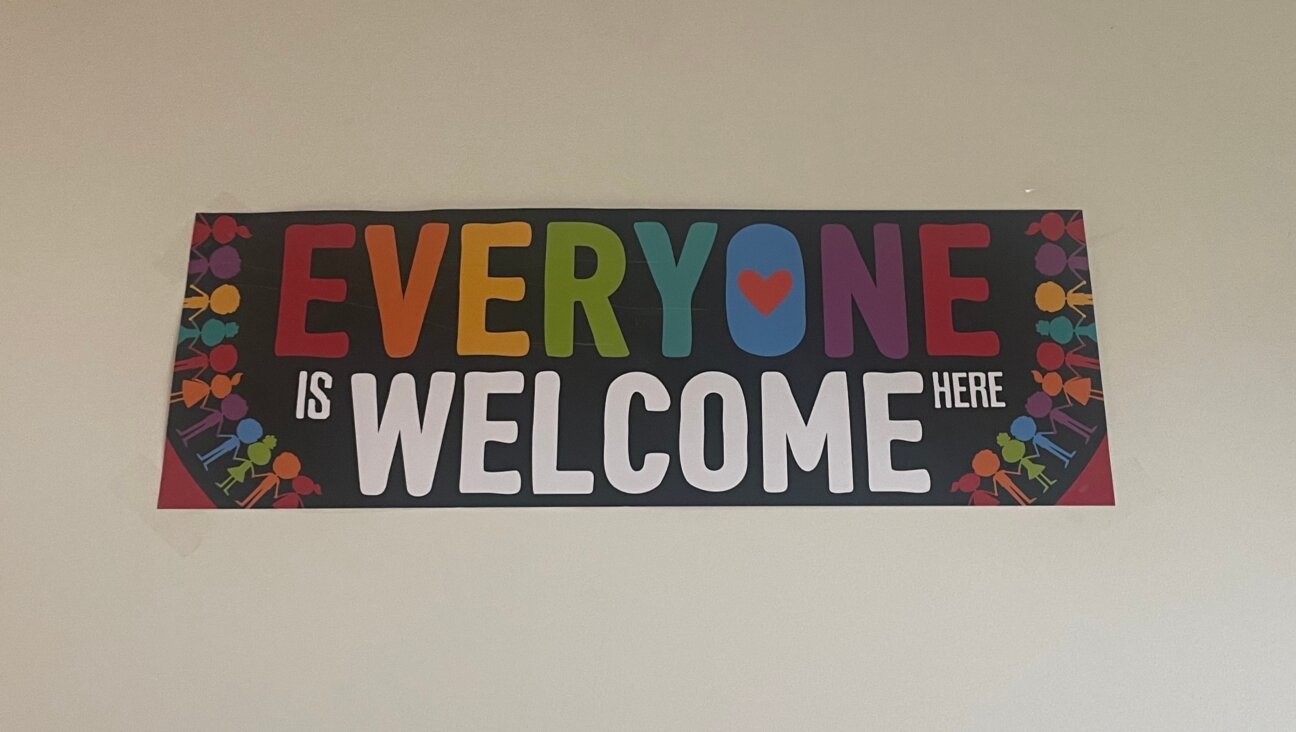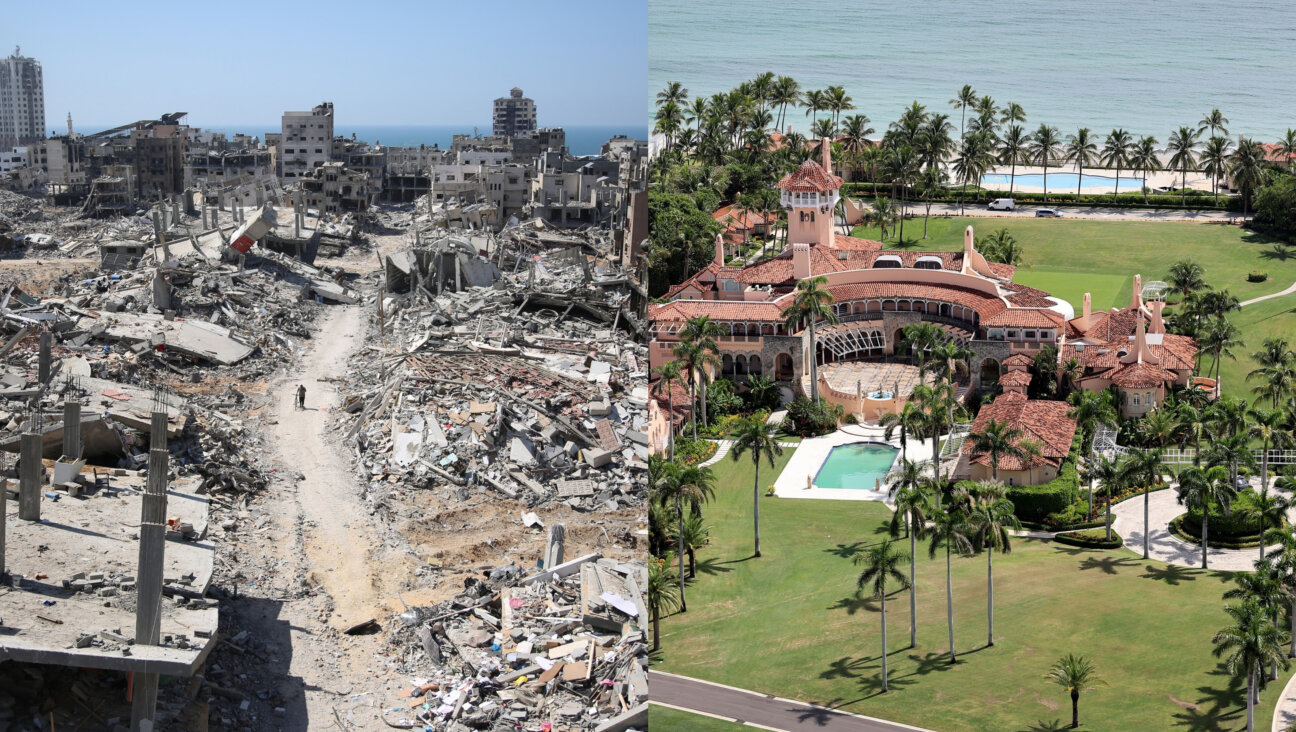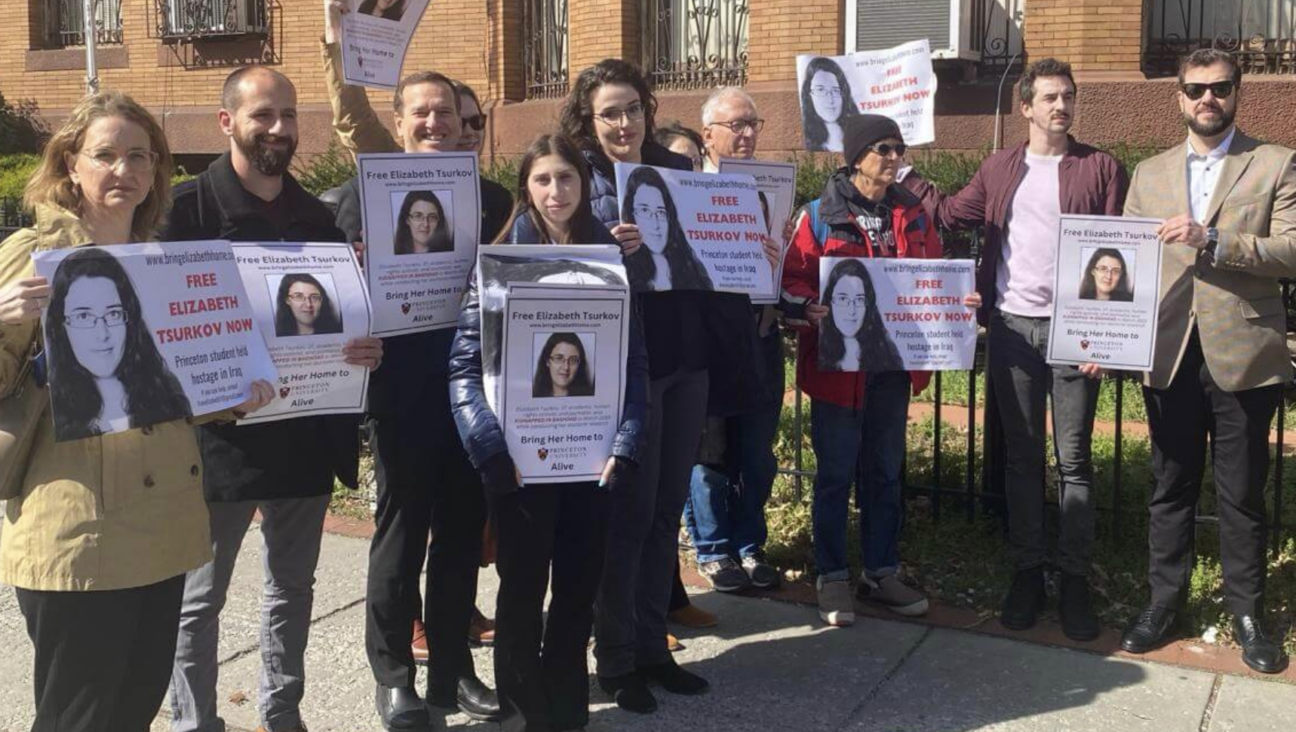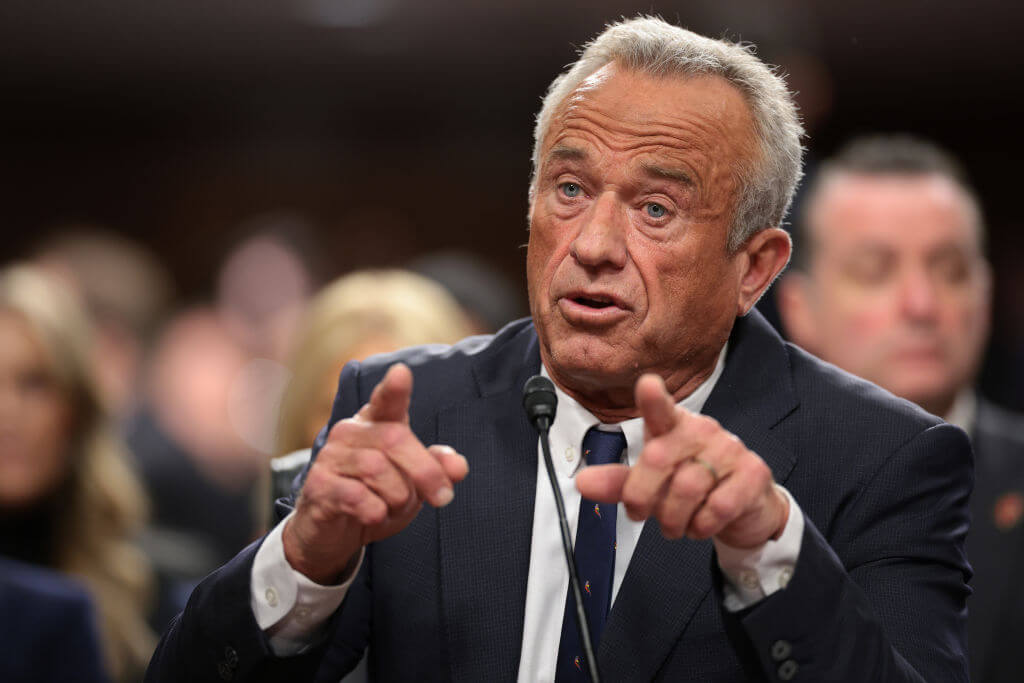At DNC, this queer, formerly Orthodox Jew is ‘Uncommitted’ and pushing for an arms embargo on Israel
‘The world is broken,’ said June Rose, 29. ‘I ask for Kamala Harris to help repair it.’
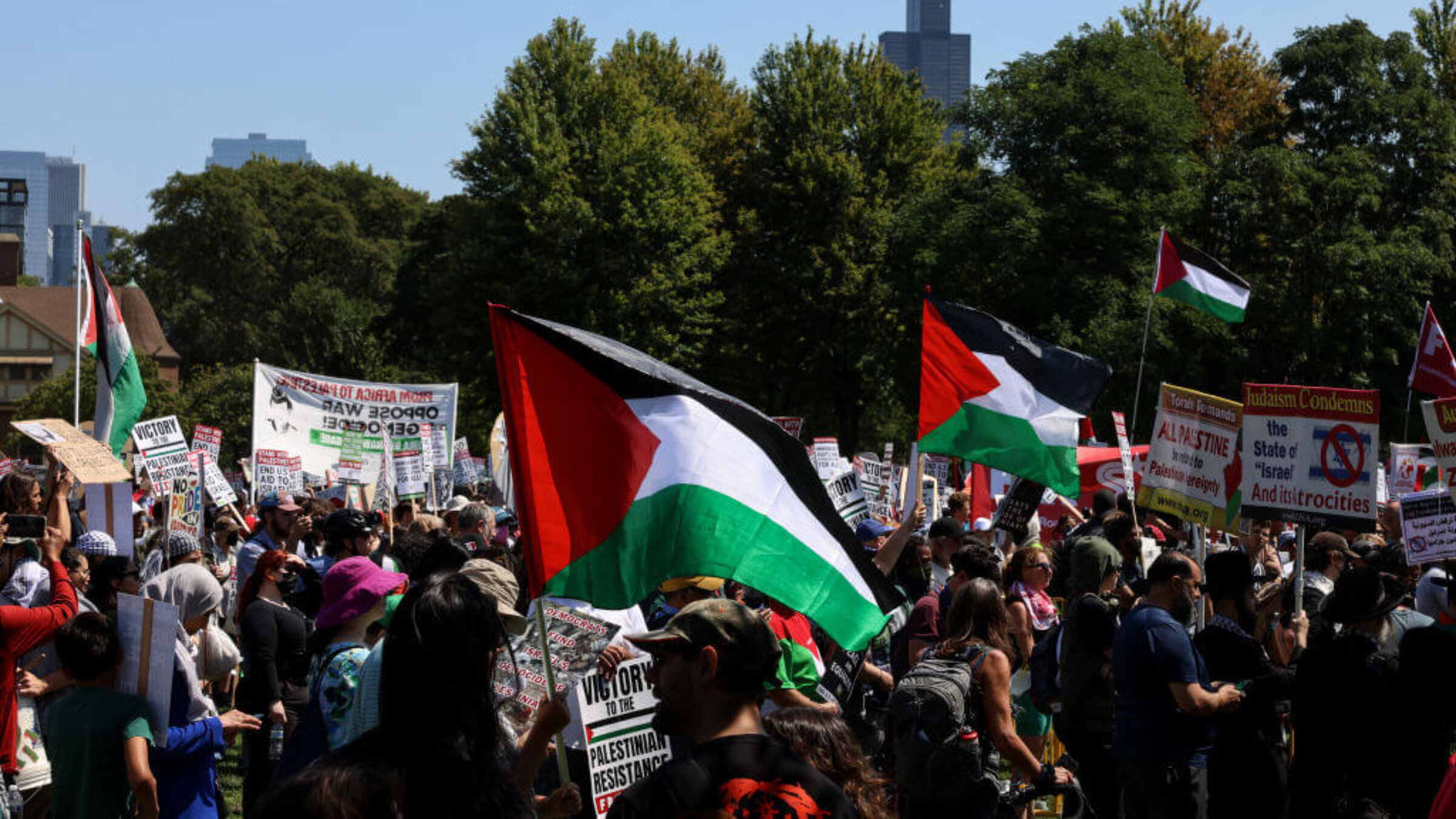
Pro-Palestinian protesters demonstrate Aug. 19 before the start of the Democratic National Convention in Chicago. Photo by Alex Wroblewski/AFP via Getty Images
CHICAGO — Even before they took their turn at the microphone, June Rose stood out among the “Uncommitted” delegates speaking on the sidelines of the Democratic National Convention Monday morning. Instead of a kaffiyeh, the signature checked scarf of the Palestinian movement, they wore a rose-and-beige patchwork blazer over a T-shirt proclaiming “Democratic Majority for Palestine.”
 Rose, who is 29, was also the only Jewish delegate at the event, representing not just the 29% of Democratic voters in their home state of Rhode Island who cast “uncommitted” ballots this spring but also the not-insignificant Jewish slice of the pro-Palestinian left that has flummoxed leaders of both the party and the Jewish establishment.
Rose, who is 29, was also the only Jewish delegate at the event, representing not just the 29% of Democratic voters in their home state of Rhode Island who cast “uncommitted” ballots this spring but also the not-insignificant Jewish slice of the pro-Palestinian left that has flummoxed leaders of both the party and the Jewish establishment.
“There is a Jewish value, a famous Jewish value, Tikkun Olam, which means to repair the world,” Rose told some two dozen journalists gathered for the first of the Uncommitted movement’s planned daily news conferences throughout the convention. “To repair the world, we have to identify what is broken.
“There is nothing more broken than President Biden claiming that in order for Jews to be safe, even here in this country, children thousands of miles away need to be killed,” added Rose, who sports a shock of dyed blond hair over a trim beard, pearl-stud earrings and manicured pink fingernails. “The world is broken. I ask for Kamala Harris to help repair it.”
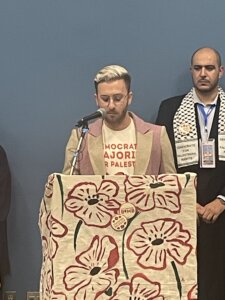
Like the other eight Uncommitted delegates who spoke on Monday, Rose called on Vice President Harris to support an arms embargo against Israel — something that is clearly not in the cards, given her prior statements and the party platform that is slated to be approved on Monday night. The Uncommitted movement, which garnered some 700,000 primary votes across about two dozen states, has also been pushing hard to get a Palestinian American speaker on the DNC mainstage one evening, a proposal whose prospects remain unclear.
In the meantime, the DNC agreed to host its first-ever conventional panel on Palestinian human rights, which began Monday afternoon.
Rose, who identifies as nonbinary and uses they/them pronouns, is one of four Jews among the 30 Uncommitted delegates at the convention, alongside Michael Berg, the former political director of the Sierra Club in Missouri; Arianna Feldman, a community organizer from Minneapolis; and Sheigh Freeberg, secretary-treasurer of Minnesota’s Hospitality & Craft Beverage Union.
Raised in an Orthodox family in Providence, Rhode Island, Rose’s perspective on the Israeli-Palestinian conflict transformed during a gap year in Israel, when they snuck away from their yeshiva during Passover break to visit the occupied West Bank.
In an interview after the news conference, they ran through their life story: Attending a “yeshivish” school in Providence where the teachers wore the movement’s iconic black hats. Making the required pilgrimage to Crown Heights, Brooklyn, to purchase a similar black hat for their bar mitzvah. Commuting to Brookline, Massachusetts, to attend Maimonides, an Orthodox high school, where they spent plenty of time in detention.
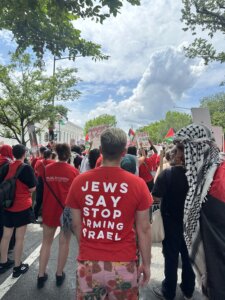
It was during their gap year at the Lev Hatorah yeshiva in Ramat Beit Shemesh, an Orthodox enclave in Israel about 15 minutes away from the separation barrier between Israel and the West Bank, that they began to wonder about the Palestinians living so nearby.
“I had always been liberal, I’d always believed in freedom and equality, except on one issue — on the issue of Israel-Palestine, I applied a different set of values,” Rose told me. “As I started having other frustrations with the Orthodox community” — about gender, sexuality, abortion and other matters — “I started exploring that inconsistency.”
Rose said they became “fixated on the idea of meeting Palestinians.” None of their classmates at Maimonides “had ever met one,” nor anyone in their yeshiva, nor anyone in their family.
“I said to myself, ‘Why can’t I just go there?’ I literally Googled, ‘How does a Jewish person meet Palestinians?’”
The answer was Encounter, a program that has been taking Jews into the West Bank for more than a decade. During the yeshiva’s break for Passover, in 2014, Rose joined a two-day trip to Bethlehem for gap-year students. “They’re the two days that changed my life more than anything in my 29 years,” they said.
View this post on Instagram
Back at yeshiva, the rabbis told Rose they could never do anything like that again. So two days later, Rose left, finding via Facebook a room in an apartment in the Baka neighborhood of Jerusalem, and volunteering at Encounter.
“I’ve never been someone who will respect someone telling me that I should not be true to my values and should not seek a deeper understanding of the world,” they explained. “What am I doing in a space that did not only not respect the humanity of my fellow human beings, but thought that for someone to propose that maybe we should care about them as people was the ultimate threat?”
The following fall, Rose enrolled at Tulane, where they majored in political science. Since graduating in 2018, they have worked on Democratic political campaigns around the country, returning in January to their hometown of Providence as chief of staff to the City Council.
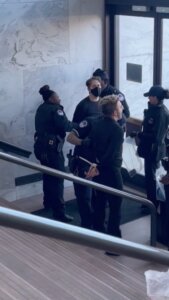
And since the Oct. 7 Hamas terror attack on Israel and the war on Gaza it spawned, Rose has been arrested three times: alongside 400 members of Jewish Voice for Peace last month in the Capitol rotunda before Prime Minister Benjamin Netanyahu’s speech to Congress; and on two other occasions sitting in at the offices of two members of Congress, once with JVP and once with the Jewish anti-occupation group IfNotNow.
“They’re getting to know me in the Capitol Police,” Rose joked.
Here in Chicago, Rose and the other Uncommitted delegates are trying to make sure the plight of Palestinians and the dissension among Democrats over Israel’s prosecution of the war are not forgotten. Along with their daily news conferences and this afternoon’s human rights panel, they are planning daily vigils for Palestinians and Israelis killed since Oct. 7. They are pushing delegates pledged to Harris to also support their cause, handing out “Ceasefire delegate” pins and considering some form of protest inside the convention hall.
This is Rose’s first time being a delegate, and their first time attending a political convention. But they said they will not be dazzled by the parties or famous pundits.
“I’m here on a mission,” Rose told me. “We’re at the largest gathering of institutional and elected Democrats, who want to make this a moment of just joy and celebration. We have a lot to celebrate and we have a lot to mourn. We’re complicated people and we can do both.”
When I asked what Rose’s family and former schoolmates thought of their transformation on Israel-Palestine, Rose demurred, saying “me and my parents spend most of our time on the things we agree on.”
Rose said they felt deep pain on Oct. 7, knowing that they could easily have been among the attendees of the Nova music festival where Hamas terrorists killed more than 300 people. A close friend is the former camp counselor for one of the more than 100 Israeli hostages who remain in captivity in Gaza.
“I wish my community, the Jewish community, felt as I do, which is that I have enough tears to cry for two people,” Rose said, adding: “I believe that my values are Jewish values, that they are capital-D Democratic values.”
They noted that, attending Jewish day schools, they studied the Holocaust every year starting in second grade. “To teach me about genocide was to teach me to be opposed to genocide,” Rose said. “Our people have experienced so much grief and pain, and continue to — that has made me empathetic to other people who are as well.
“My Jewish values say no innocent children need to die.”
A message from our Publisher & CEO Rachel Fishman Feddersen

I hope you appreciated this article. Before you go, I’d like to ask you to please support the Forward’s award-winning, nonprofit journalism so that we can be prepared for whatever news 2025 brings.
At a time when other newsrooms are closing or cutting back, the Forward has removed its paywall and invested additional resources to report on the ground from Israel and around the U.S. on the impact of the war, rising antisemitism and polarized discourse.
Readers like you make it all possible. Support our work by becoming a Forward Member and connect with our journalism and your community.
— Rachel Fishman Feddersen, Publisher and CEO








